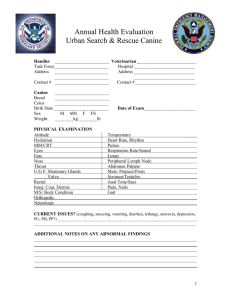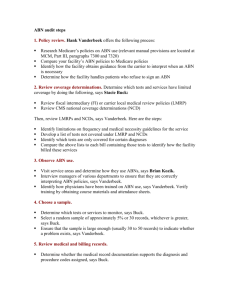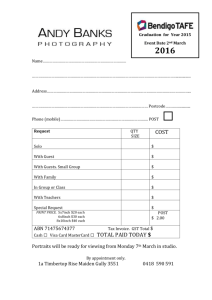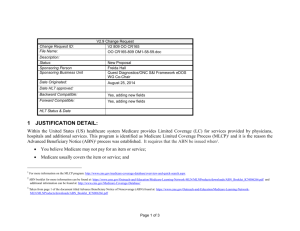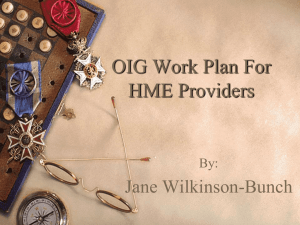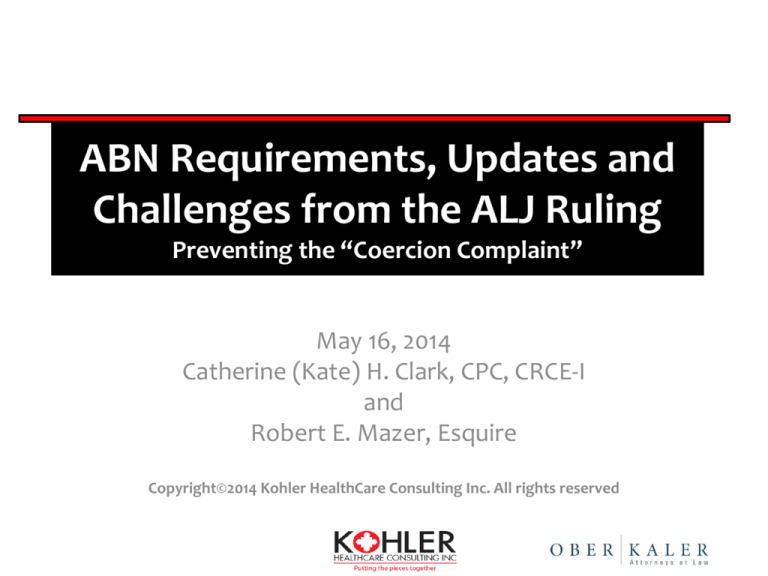
ABN Requirements, Updates and
Challenges from the ALJ Ruling
Preventing the “Coercion Complaint”
May 16, 2014
Catherine (Kate) H. Clark, CPC, CRCE-I
and
Robert E. Mazer, Esquire
Copyright©2014 Kohler HealthCare Consulting Inc. All rights reserved
Financial Liability Protections (“FLP”)
Under Medicare
•
•
•
•
Limitation on Liability (“LOL”)
Refund Requirements (“RR”)
Without Fault Provisions
Except as otherwise noted, references to “MCPM”
are to Medicare Claims Processing Manual, Ch. 30.
2
Limitation on Liability
(42 U.S.C. § 1395pp)
• Applies to: Part A services and assigned Part B
claims
• Principal application:
• Item/service not reasonable and necessary in particular
instance; screening tests performed more frequently
than covered
• Not categorical denials, such as routine physicals, most
screening tests, cosmetic surgery, routine eye, dental
and foot care
3
Limitation on Liability
• Medicare indemnifies beneficiary if provider
“knew, or could be expected to know, that
payment . . . could not be made,” but beneficiary
did not have such knowledge. 42 U.S.C. §
1395pp(b).
• When beneficiary did not have such knowledge,
but provider knew, or could have been expected to
know, of exclusion, liability rests with provider, i.e.,
no payments available from Medicare or
beneficiary. MCPM § 10.
4
Limitation on Liability
• No Medicare payments if beneficiary and provider
“knew, or could reasonably have been expected to
know, that payment could not be made….” 42
U.S.C. § 1395pp(c).
• When beneficiary knew or could have been
reasonably expected to know items/services not
covered, liability rests with beneficiary, i.e.,
beneficiary responsible for paying provider. MCPM
§ 10.
5
Limitation on Liability
• Medicare pays when both beneficiary and provider
“did not know, and could not reasonably have
been expected to know, that payment would not
be made . . ..” 42 U.S.C. § 1395pp(a).
• Medicare makes payment when neither beneficiary
nor provider knew, and could not reasonably be
expected to have known, items/services not
covered. MCPM § 10.
6
Knowledge of Likely Payment Denial
• Beneficiary’s Knowledge – Based on written notice
provided to beneficiary, or other means from which
beneficiary knew, or should have known, that payment
would not be made. MCPM § 40.2.1.
• Provider’s Knowledge – Deemed to include
information in CMS or MAC notices, including manuals
and bulletins, NCDs, and community standards of
practice. 42 CFR § 411.406.
• Both – When provider furnishes ABN, provider and
beneficiary knew payment would be denied. MCPM §
40.1.1.
7
Limitation on Liability
Medicare Interpretations
• Payment from beneficiary cannot be requested if
provider knew or should have known that Medicare
would not pay “and fails to issue an ABN when required
or issues a defective ABN.” MCPM § 50.7.3.
• Provider required to notify beneficiary in advance that
item/services likely to be denied (in the form of an ABN
or other acceptable written notice). MCPM § 50.2.1.
• Failure to furnish proper ABN does not automatically
protect beneficiary who otherwise knew payment
would be denied. MCPM § 40.2.4
8
Limitation on Liability
Medicare Interpretations
• “NOTE: This chapter often uses the term ‘ABN’ to
signify all limitation of liability notices, not just a
specific ABN form such as the CMS-R-131.” MCPM §
20.
• “When, for a particular purpose, an approved
standard form (e.g., Form CMS-R-131 …) exists, it
constitutes the proper notice document. Notices
not using a mandatory standard notice form may
be ruled defective.” MCPM § 40.3.1.
9
Refund Requirements Statute
(42 U.S.C. 1395m(a)(18))
• Applies to:
• Claims for medical equipment and supplies
• Unassigned claims for physicians’ services
• Principal application: not reasonable and necessary.
• Statutory standard: Supplier required to refund
amounts from patient unless:
• Before item furnished, patient informed that payment may
not be made and agrees to pay; or
• Supplier “did not know and could not have been expected to
know that payment may not be made.”
• Beneficiary can be held liable only if he/she signed
ABN. MCPM § 10.
10
Without Fault
• No recovery of overpayment where incorrect
payment recipient “without fault,” if recovery
would defeat purposes of Medicare or be against
equity and good conscience. 42 U.S.C. § 1395gg(c).
• Provider is without fault if exercised reasonable
care in billing and accepting Medicare payment.
MFMM Ch. 3 § 90.
• disclosed all material facts
• reasonable basis for assuming payment was correct,
based on Medicare instructions, regulations and other
available information.
11
What is an ABN?
Advanced Beneficiary Notice of Non-Coverage
• An ABN is a prescribed form providers and suppliers
must use to notify a Medicare patient that Medicare
might not cover the items or services he or she is about
to receive.
• An Advance Beneficiary Notice (ABN), also known as a
waiver of liability.
• It’s a Medicare form found at:
http://www.cms.gov/Outreach-andEducation/Medicare-Learning-NetworkMLN/MLNProducts/downloads/abn_booklet_icn00626
6.pdf
12
What is the purpose of an ABN?
ABNs allow beneficiaries (your patients) to make
informed decisions about whether they would like to
accept items or services despite the possibility of
having to pay out-of-pocket.
A signed ABN form serves as proof that a patient
knew prior to accepting such services that he or she
might have to pay out-of-pocket for them.
13
ABN Use
• Providers are not required to give an ABN for
services or items explicitly excluded from the
Medicare coverage (items that are never covered
by Medicare even if medically necessary such as
hearing aids).
• ABNs only apply if the “Original Medicare,” not for
a Medicare private health plan (HMO, PPO or
PFFS).
• A “never covered” service or item does not require
an ABN to have the patient responsible. Use of
ABN is voluntary.
14
ABN Use
• There is an option on the ABN to check whether or
not the patient wants claim to be submitted to
Medicare for the service. If it was checked “no”,
then the claim submission is not required.
• If an ABN is signed, Medicare is billed and Medicare
denies coverage. The patient can always appeal.
15
How can an ABN be considered invalid?
A patient might not be liable for the charges if the ABN is
invalid for the following reasons:
• It is illegible or the font is small (less than 12 point) or hard to read.
• The provider did not use the official CMS ABN form.
• The provider overuses ABNs (issues them with no reason to believe
claims may be denied.)
• The ABN does not list the actual service rendered.
• The form is more than one year old.
• The form is signed after the date of service.
• The form is given to someone that cannot understand it.
• The form is given to someone in an emergency.
• The form is given after initiation of service or patient preparation
(i.e., placement in the MRI machine).
16
Appeals
• The patient can always appeal an ABN if they think
it is not valid
• Recent Administrative Law Judge (ALJ) case has
the industry concerned.
17
How does the provider or supplier know whether
Medicare considers a service medically necessary?
• First “medical reasonable and medically necessary”
needs to be defined and coverage issues.
• The definition of “reasonable and necessary” varies
based on both National Coverage Determinations
(NCDs) and Local Coverage Determinations (LCDs).
Each provider or supplier is responsible for knowing
the current NCDs and LCDs governing these services.
• They can download the Medicare NCD Manual here
http://www.cms.gov/Regulations-andGuidance/Guidance/Manuals/Internet-Only-ManualsIOMs.html
• Can identify the LCDs associated with their particular
geographic region by using the search tool found on
http://www.cms.gov/medicare-coverage-database/
18
Use of Modifiers
• Determine that certain services are not medically reasonable and
medically necessary based on these guidelines—and issues an
ABN accordingly—then add the GA modifier to the claim to
indicate ABN use.
• Submit claims to Medicare, noting the GA modifier, which will
trigger Medicare to reject the claim. After receiving the Medicare
denial, provider or supplier can then collect out-of-pocket
payment from patients.
________________________________________________________
GA – Not medically necessary (ABN on file)
GY – Statutory exclusion (ABN provided) – often used to get
secondary payer coverage
GX – “Notice of Liability Issued, Voluntary Under Payer Policy”
GZ – Not medically necessary (ABN not on file)
19
Physical Therapy Use of ABNs
When should a therapist issue and ABN?
An ABN must be issued in either of the following
instances:
• Before providing items or services that the provider or
supplier believes or knows Medicare may not cover
• Before providing items or services that Medicare
usually covers but may not consider medically
reasonable and medically necessary for this particular
patient in this particular case
In either instance it must always complete the form and
have patient sign it prior to the time of service.
20
What are the ABN “no-no’s”?
“Blanket ABNs”
• An ABN for every patient
• An ABN for every service
21
Physical Therapy:
Special rules regarding therapy cap
• The American Taxpayer Relief Act (ATRA) of 2012 includes a significant
change in policy regarding the use of ABNs once patients exceed the
therapy cap.
• Effective January 3, 2013, providers must issue a valid ABN to collect
out-of-pocket payment from Medicare beneficiaries for services above
the therapy cap that Medicare deems not reasonable and necessary.
• Therapists should not issue an ABN for every beneficiary who exceeds
the therapy cap; only when they believe the services in question do not
meet Medicare’s definition of “reasonable or necessary.”
• This is a significant change from pre-2013 rules, which did not require therapists
to issue ABNs for beneficiaries to be held liable for denied charges above the
therapy cap.
• Now, if a therapist decides to issue an ABN to a patient who exceeds the
therapy cap, the therapist will not attach the KX modifier to that claim. If there
is no KX modifier on the claim and the therapy cap has been exceeded, the claim
will be denied. The patient can then be charged for the visits.
22
Physical Therapy:
What does the KX modifier mean?
• Therapist attests that he or she believes the
services are reasonable and necessary. Once a
therapist uses the KX modifier, he or she cannot
retroactively issue an ABN.
• In the event that Medicare denies a claim that
includes the KX modifier, the therapist—not the
patient—is responsible for the cost of services.
23
Physical Therapy:
After and ABN – is the functional limitations reporting required:
Even if the therapist knows that Medicare will deny
the claim and the patient will pay for the services outof-pocket, the therapist still must submit the claim to
Medicare.
Must complete functional limitation reporting on the
patient.
24
Physical Therapy:
No ABN, but meets the established criteria
If a therapist does not issue an ABN as Medicare
requires, the therapist cannot bill the Medicare
beneficiary for the services in question.
If Medicare ends up denying the claim, the therapist
would then be responsible for the cost of the
services.
25
DME POS
Special Considerations
ABNs in the context of the DMEPOS competitive bidding program.
• Federal regulations clearly state that implementation of the
competitive bidding program “does not preclude the use of an
advanced beneficiary notice.”
• CMS guidance provides a framework for issuing ABNs under
competitive bidding.
• Questions related to whether ABN usage may or may not be
appropriate need to be addressed. They generally fit into the
following categories:
1.
2.
3.
4.
Upgrade ABNs for items having different HCPCS codes
Upgrade ABNs for items within a common HCPCS code
ABN usage and competitive bidding’s non-discrimination provision
ABN usage for non-contract suppliers within a competitive bidding
area
26
DME POS
Upgrades
• CMS defines an upgrade as “an item with features that go
beyond what is medically necessary,” including features that are
“more extensive and/or more expensive” than what Medicare
has determined to be reasonable and necessary for the patient.
• Although this definition has limits, the broad language used by
CMS seemingly allows suppliers to issue ABNs for nearly any
excess component that may be added to a medically necessary
DMEPOS item.
• In a December 2010 CMS competitive bidding program fact sheet,
which stated that “when a [contract or non-contract] DMEPOS
supplier expects that a DMEPOS item does [not] or may not meet
Medicare’s reasonable and necessary rules, it is the responsibility
of the supplier to notify the beneficiary in writing via an ABN.” See more at: http://homecaremag.com/medicarereimbursement/abcs-proper-abn-usage#sthash.74R2beKO.dpuf
27
Special Conditions: Home Care
Home Health Advanced Beneficiaries Notice
(HHABN), from CMS-R-196 is replaced by ABN
• See MLN-Matters Number MM8404 and CR
Transmittals R2782CP
• Also called Limitation of Liability (LOL)
• Not to be used in Medicare Managed Care
28
Home Care
29
Home Care
30
Home Care Limitations
The HHA must issue a beneficiary an ABN prior to
delivering care that is usually covered by Medicare, but in
this particular instance, the item or service may not be or
is not covered by Medicare because:
• The care is not medically reasonable and necessary;
• The beneficiary is not confined to his/her home (is not
considered homebound);
• The beneficiary does not need skilled nursing care on
an intermittent basis; or
• The beneficiary is receiving custodial care only.
Note: HHA still subject to Therapy Limitations
31
OIG’s Review
Of Appropriate ABN Use and Application
• Report issued on May 3, 2013 by the OIG evaluated
how the modifiers were handled in contractor
adjustment process
(http://oig.hhs.gov/oei/reports/oei-02-10-00160.pdf)
• Previously reviewed in 2009
• Clear indication from OIG that MACs and CMS not
being careful and that CMS needs to address these
issues
32
OIG Findings
• In 2011 Medicare paid nearly $744 million for Part B
claims with G modifiers that procedure expected to
be denied
• Many times modifiers are ignored in the MAC review
process
33
Clinical Laboratory Tests
• Can bill beneficiary for services denied on medical
necessity grounds only if lab informed patient that
Medicare likely to deny payment. 66 Fed. Reg. at
58804.
• To receive protection against possible LOL liability,
physician or laboratory must obtain signed ABN
before furnishing test. MCPM Ch. 16 § 40.7.
34
Clinical Laboratory Tests
• ABN not required to bill beneficiary for “screening
tests” included in NCD as “ICD-9-CM Codes
Denied.” 66 Fed. Reg. at 58793.
• Test deemed “Research Use Only” or
“Investigational Use Only” denied based on “not
reasonable and necessary,” so subject to ABN
requirements. MCPM § 50.3.1.
• ABN can be provided by lab or ordering physician;
physician must furnish copy of signed ABN to
billing lab. MCPM § 50.6.4.
35
Clinical Laboratory Tests
• If ABN cannot be delivered in person, can be
delivered prior to testing via:
• Telephone (must be followed by written notice/
signature)
• Mail
• Secure fax
• E-mail
• HIPAA (and state law) requirements apply
MCPM §§ 40.3.4.2, 50.7.2.
36
Clinical Laboratory Tests
• Prohibition against routine use of ABNs does not
apply to:
• Tests always denied based on medical necessity per NCD
or
• Research Use Only and Investigational Use Only tests.
MCPM § 40.3.6.4
• Charge to beneficiary not limited to Medicare fee
schedule. MCPM § 50.7.3.
37
Clinical Laboratory Tests
• Labs can customize ABNs to include:
• Preprinted list of tests to be checked as applicable
• Preprinted reasons why Medicare may not pay
• Not for your condition
• Exceeds frequency limits
• Experimental/research use
MCPM § 50.6.2
38
Appeal of Olympic Medical Center
Facts/Background
• Medicare beneficiary advised by physician of need
for lab tests and MRI to diagnose hearing loss
• Upset patient presents at hospital and is provided
and signs ABN
• Medicare denies claim for test and beneficiary
appeals; contractor affirms denial
After adverse QIC reconsideration decision, hospital
requests ALJ hearing
39
Appeal of Olympic Medical Center
ALJ Issues
• Tests covered?
• If not, should Medicare pay based on LOL?
ALJ Determinations
• Tests not covered based on NCDs
• Hospital not protected by LOL because it knew or
reasonably should have known that tests were not
covered
40
Appeal of Olympic Medical Center
ALJ Determinations: Patient protected by LOL
“Beneficiary must be notified far enough in advance … [to] make a rational,
informed consumer decision without undue pressure. Last minute notification can
be coercive, and a coercive notice is a defective notice.
*
*
*
“Beneficiary could not have made a rational, informed consumer decision … since
… presented with … ABN immediately before … services were to be
performed…. ABN is invalid as it was not delivered timely. … Beneficiary did not
know and could not reasonably be expected to know that … services … would not
be covered.… [L]iability of … Beneficiary … waived….”
ALJ Appeal No. 1-1097162747 (Dec. 9, 2013), appeal pending, Medicare Appeals
Council (2014)
41
Clinical Laboratory Tests
• LOL may protect lab with no reason to know that tests
not reasonable and necessary, including based on lack
of documentation of test order or medical necessity in
physician’s records. See, e.g., 66 Fed. Reg. 58788,
58801 (Nov. 23, 2001).
• Medicare contractors (MACs, CERTs, RACs, ZPICs)
required to make LOL and “without fault”
determinations whenever test found not reasonable
and necessary. MPIM Ch. 3 § 3.6.2.3.
• Lab’s constructive knowledge of CMS manuals and
contractor guidance may prevent reliance on LOL for
claims denied based on Medicare policy. Doctors
Testing Ctr., LLC v. HHS, 2014 WL 112119 (E.D. Ark. 2014).
42
Presenter Information
Catherine (Kate) H. Clark, CPC, CRCE-I
cclark@kohlerhc.com
Robert E. Mazer, Esquire, Principal
remazer@ober.com
Ober|Kaler, A Professional Corporation
43
Questions and Answers
44


